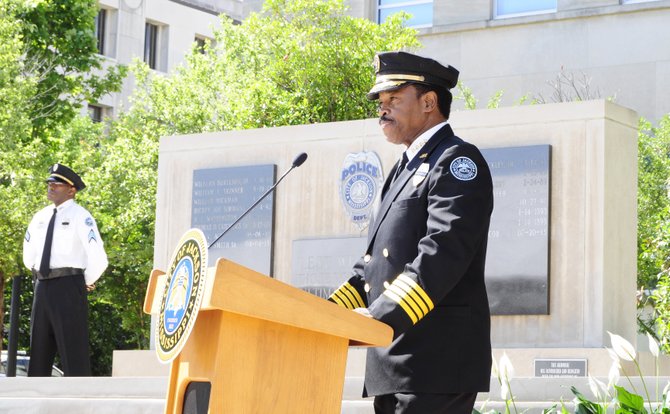Jackson Police Chief Lindsey Horton said the mayor’s office has given JPD a green light for additional overtime related to crime reduction in the city. Photo by Trip Burns.
At about 11 p.m. on the evening of May 20, Tolu Olorunda was walking back to his west Jackson residence from a late dinner when a Jackson police officer stopped him and started asking questions. Olorunda said the officer asked for his name and address, which he was hesitant to provide.
The officer said there had been a "rash of robberies" in the neighborhood and that Jackson Police Department policy requires officers to stop people in crime hotspots. When Olorunda continued to question the officer about his motive for making the stop, he said the officer also made him put his hands on the hood of the police cruiser and searched Olorunda's pockets.
Olorunda, a Jackson State University graduate student who came to Mississippi earlier this year to do community organizing work with late Mayor Chokwe Lumumba, said he'd walked the same neighborhood for months with no problems.
"I don't think it's right to stop me just for walking," Olorunda, 24, told the Jackson Free Press about the incident.
Although the stop could be dismissed as an isolated incident or even as justified if the neighborhood is indeed experiencing a crime wave, the incident could represent a new era of heavy-handed policing in the capital city. This is especially true, considering that Jackson city officials are pushing for a more aggressive policing stance.
Overall, major crime is down 5 percent compared to last year. That drop includes dips in property and violent crime. However, data from JPD show that the homicide rate has shot up 75 percent compared to last year—to 28 so far this year from 16 in the same time period in 2013.
Mayor Tony Yarber, who formerly represented south Jackson on the city council, said recently that he was "sickened" and "disgusted" by the spate of homicides that has Jackson reeling and looking for solutions.
One solution Yarber has floated includes creating a special unit for narcotics, which he said is at the root of most violent crime in Jackson. Yarber said citizens could also expect to see more of JPD "policing the little things."
Oversight for the strategy would fall to Marshand Crisler, deputy chief administrative officer and public-safety commissioner, who now coordinates public-safety divisions, include JPD and the Jackson Fire Department.
A similar tactic was implemented in New York City under Mayor Rudolph Giuliani and his police commissioner, William Bratton. Bratton, who left the NYPD to become chief of the Los Angeles Police Department, is a self-described adherent of the "broken windows" theory of policing.
"My objective as commissioner was to focus on improving life in NYC by focusing on all details of crime, from graffiti to the high rate of murder, methodically using data and statistics to track patterns and to place police where they could be most effective," Bratton writes on his own LinkedIn profile.
The rationale of focusing on petty crimes is that people are less likely to commit violent crimes if they know something as simple as jaywalking could attract the attention of the cops.
An outgrowth of NYC's quality-of-life campaign, which New York Times magazine writer James Traub described in 2001 as designed to make New York "fit for corporate habitation" was the NYPD's stop-and-frisk policy. Stop-and-frisk involves officers stopping people ostensibly at random and searching them for weapons and other contraband.
Also used in Detroit, the policy was heavily panned as a means of racial profiling and eventually drew a lawsuit from civil-liberties groups who said blacks and Latinos were being stopped and frisked with greater frequency than whites. It also led to several shootings of innocent search targets by jittery police officers.
JPD Assistant Chief Lee Vance was unfamiliar with the incident involving Tolu Olorunda, but said although stop-and-frisk may employed under certain circumstances, it is not being used as a blanket strategy in response to the homicides.
Rather, Vance said the police department will allow officers to work overtime so that the patrol division can increase visibility in areas where shootings have taken place.
"Mayor Yarber and Chief (Lindsey) Horton have allowed us to use an extra bit of overtime to have extra visibility in these neighborhoods for safety reasons," Vance said.
"I think it's commendable," Vance said. "We are going to be as fiscally responsible as we can be with the use of that extra overtime, but at the same time, to me, it is a clear illustration to me that this mayor and this chief are putting safety over finance, which is something I admire. "
Olorunda is also being cautious. Because he does not own a car, he moved out of state for the summer partly to avoid further run-ins with JPD, he said.
More like this story
- Time to Rethink Local Policing Strategies
- Schools, Guns, Family, Bad Policing: Chief Vance Discusses Crime-Fighting with JFP Editor
- Mayor, Police Chief Address Poverty-Crime Connection, Solutions Going Forward
- [Balko] The Other Broken Windows Fallacy
- Bloomberg Talks Justice Reform in Mississippi, Apologizes for ‘Stop and Frisk’



Comments
Use the comment form below to begin a discussion about this content.